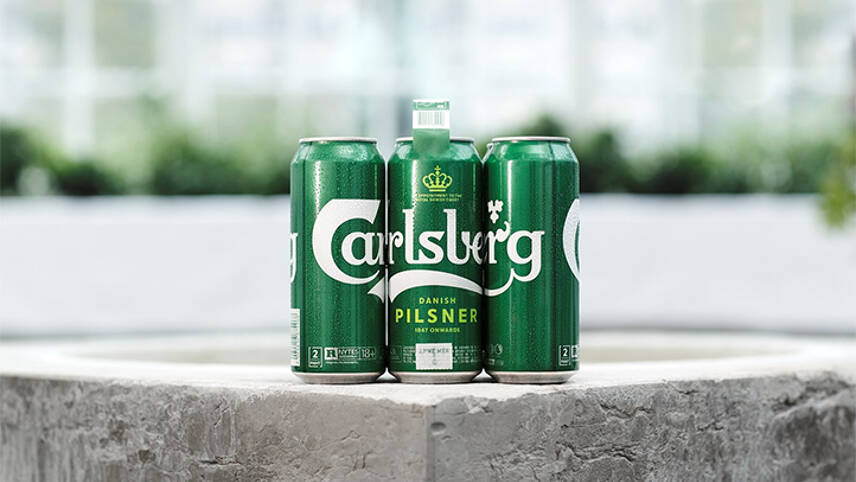This premium content is exclusive to edie Members.
To find out more about edie Membership, please click below.
If you are an existing member, login here

At a glance:
Who – Carlsberg Marston’s Brewing Company (CMBC)
What – Factory equipment upgrades to enable the use of innovative packaging and to reduce water use
Where – CMBC’s brewery in Northampton, England
When – Investment announced October 2023, upgrades due for completion Q1 of 2024
Why – Reduce water use, packaging material use and costs
The challenge:
CMBC’s ‘Together Towards Zero’ and ‘Beyond ESG’ sustainability plans include ambitions to halve the use of virgin fossil-based plastics in packaging by 2030; achieve zero water waste at every brewery and reduce water intensity to 2.0hl per hl of beer produced.
These are ambitious targets that will require a string of changes to manufacturing processes.
The solution:
CMBC is investing in sustainability improvements at its Northampton brewery. It will install equipment that enables it to scale the production of can multipacks in a ‘Snap Pack’ format. This format sees plastic multipack rings replaced with dots of glue that can be placed with the cans in home recycling.
The business is also installing a replacement can filler and seamer which will reduce the brewery’s water use by 10% each year, equivalent to 18 million litres.
How the project works:
CMBC is investing in new packaging equipment at Northampton that will increase the site’s capacity for producing beer multipacks in the ‘Snap Pack’ format. This format was first launched to customers in 2018 and was co-developed by CMBC and packaging equipment manufacturer KHS GmbH.
Snap Packs are glued together rather than being connected by flexible plastic multipack rings which are not collected for recycling from most homes in Europe. Instead, these rings are commonly littered, landfilled or incinerated. Snap Pack glue can be placed in most domestic recycling bins.
CMBC has confirmed that the investment will double the number of Snap Pack multipacks produced at Northampton. This will be key as it works to transition all multipacks to Snap Packs by the end of 2024, up from 65% in 2022.
Meanwhile, an upgrade to Northampton’s KHS can filler and seamer will drive water efficiency improvements.
The company is also installing a new laser can coder manufactured by Domino. This will drive some smaller gains in water efficiency and is also expected to improve efficiency and safety more generally. Overall, CMBC is expecting to see the site’s annual water use cut by 10% once all upgrades are complete in the first quarter of 2024. This is equivalent to 18 million litres.
The results:
Snap Packs reduce plastic usage by up to 76% compared to previous iterations of multipack packaging. The exact level of reduction depends on the brand and whether the pack contains four or six cans. Brands using the packaging format include Carlsberg Danish Pilsner, San Miguel, Birrificio Angelo Poretti and Brooklyn Pilsner.
The packaging line upgrade will push CMBC towards its ambition of only using Snap Packs by the end of 2024 and to its broader goal of halving virgin, fossil-based plastic packaging use by 2030.
As noted above, significant savings are expected in terms of water.
Business benefits:
The significant reduction in water touted will doubtless reduce utility bills for the site. It will also feed into the company’s plans to maintain water security as extreme weather events that impact the ability of freshwater around the world become more intense and frequent. July 2022 was, for example, the driest in England since 1935 and drought was declared in most UK regions that summer.
Regarding Snap Packs, the format is certainly a way for the company to engage with stockists and individual customers on plastic-related issues. Beyond this, businesses in the UK are now subjected to a plastic packaging tax on plastics not containing at least 30% recycled content and are preparing for broader Extended Producer Responsibility (EPR) reforms. This chance can help CMBC stay ahead of the regulatory and legislative curve.
CMBC is also touting general improvements to efficiency and health and safety at the site.
Investment & savings:
Investment has been touted to be in excess of £10m. Estimated financial savings have not been disclosed but could be significant as UK Plc faces high utility bills at present.
Industry context:
CMBC is not the only major beverage producer seeking to reduce its plastic packaging and water use.
Diageo started replacing all plastic packaging from Guiness, Smithwicks and Harp multipacks in 2019. Heineken eliminated plastic shrinkwrap and rings from multipacks sold in the UK in 2021. Budweiser Brewing Group UK and Ireland had phased out rings by the end of 2020 in favour of paperboard boxes and ‘clips’.
Budweiser Brewing Group UK&I is a subsidiary of Anheuser-Busch InBev, the world’s largest brewer. One of this parent company’s other brands, Corona, has trialled both paperboard-based six-pack rings and “fit-packs” – stackable cans which screw together.
Supermarket stockists of these brands are also making changes. Tesco does not use rings on its own multipacks for example, and suppliers have been asked to prove their alignment with the retailer’s own plastics strategy or face potential delisting.
Regarding water efficiency, the need to act is becoming ever more pressing for brewers across the industry as physical climate impacts materialise. Diageo has stated that it operates 43 sites in water-stressed areas and has a location-specific stewardship strategy, as does AB InBev.
© Faversham House Ltd 2024 edie news articles may be copied or forwarded for individual use only. No other reproduction or distribution is permitted without prior written consent.

